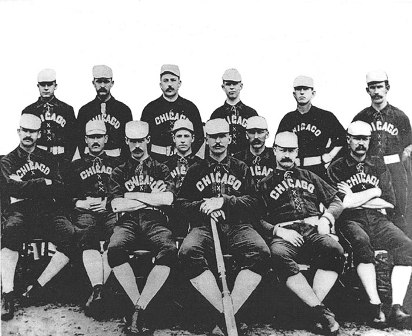The Eastern Illinois League began with great promise in the spring of 1907 to fill the void created by the collapse of the first incarnation of the Kitty League. Joe “Wagon Tongue” Adams, an Illinois native who appeared in one game for the 1902 St. Louis Cardinals, was said to be the guiding force behind the league, he was also manager on the Pana Coal Miners. Adams had helped create the Central Illinois League two years earlier with teams from many of the same cities—unlike the 1905 effort, the Eastern Illinois League was granted membership in the National Association.
The six-team league had franchises in Centralia, Charleston, Mattoon, Pana, Shelbyville and Taylorville, and elected Charles Welvert, a Pana businessman league president. Midway through the 1907 season the Centralia team relocated to nearby Paris, Illinois, and replaced Welvert as league president by Louis A. Godey Shoaff (often incorrectly spelled “Schoaff”), editor and publisher of The Paris Gazette.
The teams in Charleston, Mattoon, Pana and Paris were supported, as The Associated Press said, “In great part from saloon interests.”
The league made news in August, when during a heated series between the Mattoon Giants and the Pana Coal Miners, The Sporting Life reported that Mattoon second baseman Fred Wilson during a dispute with Pana manager Adams:
“Wilson put Adams down with a straight jab on the jaw. The manager came up, but another blow in the same place fractured his chewing apparatus.”
The Mattoon Giants won the 1907 championship, led by the pitching of future Major Leaguer Grover Lowdermilk, who posted a 33-10 record with a 0.93 ERA. Although records for the league are nearly nonexistent, contemporary newspaper accounts mention other past and future Major Leaguers who appeared in the league including Harry Patton, Joe Yeager (after his release from the St. Louis Browns in 1908), Cecil Coombs, and Hosea Siner.
The league appeared to be in good shape heading into 1908, adding teams in Danville, Illinois and Vincennes, Indiana. But as it prepared for the beginning of its second season other forces were ensuring it would be its last.
William Ashley “Billy” Sunday, the former outfielder for the Chicago White Stockings, Pittsburgh Alleghenys and Philadelphia Phillies, turned evangelist and temperance supporter was spending the early months of 1908 holding a five-week long revival in Decatur, Illinois and advocating for citizens throughout Illinois to vote their towns dry during local option elections in April.
Sunday’s revival was a huge success, according to The Associated Press “there were 5,843 conversions;” and the service “on ‘booze’ was attended by 8,000 enthusiastic local optionists.”
When the polls closed on April 7, six of the league’s eight towns were voted dry. The Associated Press said:
“With the saloons out of business, subscriptions of new stock (in the teams) will be cancelled in many instances.”
The league was in trouble. It got worse worse when Sunday moved his revival to Charleston in April and began a new crusade against playing games on Sunday.
The 1908 season was chaotic. New investors were scarce. Some Sunday games were played, but attendance was down. In July the Danville Speakers relocated to Staunton and the Pana Coal Miners moved to Linton, Indiana (incorrectly listed on Baseball Reference as Linton, Illinois). Early in August the Mattoon Giants were on the verge of collapse. The league finally disbanded on August 20, 1908, the Speakers were declared 1908 champions.
Professional baseball never returned to Charleston, Pana, Linton, Staunton, and Shelbyville. Taylorville had a team in the Illinois-Missouri League in 1911. Vincennes was part of the reformed Kitty League in 1910-11 and 1913. Beginning in 1910 Danville was in and out of the Three-I League for the next forty years. Mattoon did not have a professional team again until 1947, Paris until 1950.



6 Responses to “The League That Billy Sunday Helped Shut Down”